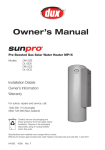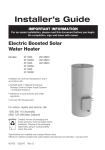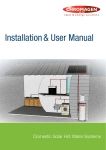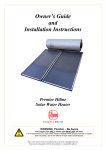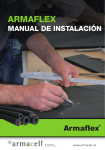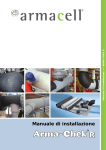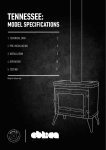Download Dux D2FL20 Specifications
Transcript
Installer’s Guide Important INFORMATION Read This Document First On completion, sign and leave with owner (Gas Post-Boost) Solar Water Heater Models: D2FN26, D2FL26, D3FN26, D3FL26, D4FN26, D4FL26 D2FN20, D2FL20 Installation by a licensed tradesperson and in accordance with: • AS/NZS 3500.4 “National Plumbing & Drainage Code Hot Water Supply Systems – Acceptable Solutions” • AS5601/AG601 Gas Installation • Adherence to local authority and OH&S regulations • Victorian PIC Requirements For advice, repairs and service, call: 1300 365 115 (Australia) 0800 729 389 (New Zealand) Carefully remove all packaging and transit protection from the heater before installation. Dispose of the packaging responsibly using re-cycling facilities where they exist. Specifications and materials may change without notice Effective for Sunpro gas post-boosted solar water heaters manufactured and sold after 1st Sept 2006. H4110 4110 Rev. F Installer’s Guide – (Gas Post-Boost) Solar Water Heater Installer’s Guide Rough In Diagram 1 Temperature Sensor 17 Read This Document First 2 Heat Trap/Non Return Valve 19 Safety Audit 2 PTR Valve 20 Removal of Existing Tank 3 Gas Connection 20 Placement of New Tank 3 GPO 21 Water Connections 4 Tempering Valve 22 Pipes – Important Points 5 Testing the Gas 22 Collectors – Alignment and Inclination Burner Test Point Pressure 23 7 Setting the Low Burner Rate 23 Collectors – Important Points 8 Setting the High Burner Rate 24 Collectors – Attaching to Roof 9 Commissioning Checklist 25 Collectors – Attaching Fittings 11 Installation Declaration 26 4 Way Union Assembly 14 Components 27 Anti-Frost Valve 15 Flashing 16 © Dux Manufacturing Limited 2011. All rights reserved. H4110 4110 Rev. F Installer’s Guide – (Gas Post-Boost) Solar Water Heater Rough In Diagram Hot Return Gas Tempering Valve A D Flow B E Cold F C 100 House rebate level 100 Approximate location of pipework. A tolerance of 25mm is acceptable to dimensions shown in table below. Note: Ensure pipes protrude horizontally from wall, and leave enough length of pipe to allow easy connections. 250 L 315 L 400 L Tank Height 1444 1754 1703 Overall diameter 617 617 705 A Hot water outlet 1230 1300 1450 B Tempered water outlet (mid-way between A and C) 505 540 615 C Cold water inlet 220 220 220 D Return from solar collectors 1231 1541 1466 E Gas entry 770 820 820 F Flow to solar collectors 600 600 600 H4110 4110 Rev. F 1 Installer’s Guide – (Gas Post-Boost) Solar Water Heater Installer’s Guide Read This Document First Step 1 • This Installer’s Guide and the Owner’s Manual (also included in the product carton) contain important information about installation and use of this water heater. Note: For an easier installation, please read this document before you begin. Safety Audit Step 2 • Arrive at site, park vehicle as close as allowable to installation, and conduct a safety audit, also known as Work Method Statements (WMS) or Job Site Analysis (JSA). • Prior to working at heights, it is the responsibility of the installer to ensure that all practices are compliant with any relevant OH&S legislation. Note: Do not commence a job where the risks cannot be controlled. • Refer to local working at heights regulations. NSW Ref: “Safe Work on Roofs – Part 2 Residential” Code of Practice 2004, Work Cover NSW. 2 H4110 4110 Rev. F Installer’s Guide – (Gas Post-Boost) Solar Water Heater Installer’s Guide Removal of Existing Tank Step 3 • The existing tank (if applicable) should be drained and removed in a responsible manner. Note: Do not drain on to grass or garden beds. Placement of New Tank Step 4 • Safely position new storage tank on a level surface in accordance with all plumbing and building regulations. Note: We recommend a plinth be installed under the water heater where the water heater is subjected to wet conditions. • Refer to the section called “Rough In Diagram” on page 1 for detailed information on position of plumbing. Install a plinth under the water heater where the water heater is subjected to wet conditions H4110 4110 Rev. F 3 Installer’s Guide – (Gas Post-Boost) Solar Water Heater Installer’s Guide Water Connections Step 5 • Using correct plumbing methods, connect the cold water pipe to the storage tank. Outlet to the heat exchanger water inlet • According to local regulations and the plumbing code, fit any and all valves that are necessary e.g. tempering valves, pressure limiting valves, line strainer, duo valves, cold water expansion valves etc. • We recommend the use of new valves for all Installation. Refer to plumbing code and/or local requirements. Cold water inlet • Connect the supplied hose from the top left tank outlet to the heat exchanger water inlet. 4 H4110 4110 Rev. F Installer’s Guide – (Gas Post-Boost) Solar Water Heater Installer’s Guide Pipes – Important Points Step 6 Critical: Due to the high temperature imposed by solar heated water, all solar system pipes and fittings must be DR brass and copper, including collector compression fittings (as supplied). No plastic pipes or fittings. Pipes must be DR brass and copper. Refer to AS/NZS 3500.4. • Flow and return lines must be installed as direct as possible between tank and collector. • Pipes must be fully insulated with UV stabilized insulation suitable for solar working temperatures. We recommend Armaflex DuoSolar / Solar insulation, minimum 13mm thick (refer to local regulations). Note: Warranty will be void if this minimum insulation requirement is not used. H4110 4110 Rev. F Pipes must be fully insulated with UV stabilized insulation suitable for solar working temperatures, minimum 13mm thick (refer to local regulations) 5 Installer’s Guide – (Gas Post-Boost) Solar Water Heater Installer’s Guide • It is critical to stop any chance of an air lock developing, so ensure that: No pipes can be higher than the air bleed valve – no pipework is higher than the automatic air vent valve – flow and return pipes from the solar collectors to the water storage tank have a minimum of 5° continuous fall – pipes have no high points that allow air to be trapped Pipes must have no high points that allow air to be trapped – the minimum number of bends in the pipes are used. • Flow and return lines should be neatly installed and hidden inside the roof cavity if possible. • Take care when running flow and return lines through the roof, cladding and the eaves. Note: Where roof and the eaves are made from asbestos, specialised handling and advice is necessary. Must fully insulate flow and return pipes To collectors Minimum 5° continuous fall Use minimum number of bends Ensure flow and return pipes from the solar collectors to the water storage tank have a minimum of 5° continuous fall Incorrect To collectors Non continuous fall 6 Correct To collectors Minimum 5° continuous fall H4110 4110 Rev. F Installer’s Guide – (Gas Post-Boost) Solar Water Heater Installer’s Guide Collectors – Alignment and Inclination Step 7 Solar Collector Alignment • For the most efficient solar gain, the collectors must be aligned ±45° from true north (i.e. north west to north east). See Collector Orientation Compass below. Collector Orientation Compass True North Collector Orientation Compass True North A NW ANE NW B NE B 50° from true north 70° from true north 45° C 70° from true north 45° C 45° C C Surface Plate West 50° from true north 45° East Surface Plate West A. Dux preferred range B. Industry accepted range A. Preferred range C. If orientations A or B are not practical, an additional collector can be B. Industry accepted range installed at the home owner’s discretion in range C (not required north C. If orientations A or B are not practical, an additional collector can be of Tropic of Capricorn) installed at the home owner’s discretion in range C (not required north of Tropic of Capricorn)please account Note: When establishing the correct Collector Orientation, for the Magnetic Declination of your geographic location Note: When establishing the correct Collector Orientation, please account for the Magnetic Declination of your geographic location Collector Inclination Guide Solar Collector Inclination Collector Inclination Guide True North • For the most efficient solar gain, the A collectors must be inclined within 10° to 45° from horizontal. See Collector Inclination Guide right. True North B A B A = 500mm, or greater if roof allows B = Between 10° and 45° A = 500mm, or greater if roof allows B = Between 10° and 45° H4110 4110 Rev. F 7 East Installer’s Guide – (Gas Post-Boost) Solar Water Heater Installer’s Guide Collectors – Important Points Step 8 • Inspect fittings after collectors are pressurized with water. Critical: Fittings must be as tight as possible. Warning: Only pressurize the the collectors for inspection and de-pressurize them immediately after inspection. Critical: Do not leave collectors pressurised for longer than 24 hours. • To prevent damage, collectors should be left pressurised only when connected to the storage tank with appropriate pressure relief valves. • Collectors can be located a maximum of 20 metres (with minimal bends) from the storage tank if pipe layout is simple. Note: For more energy efficiency, locate the collectors as close as possible to the tank • This system is suitable for 2 storey homes. 8 H4110 4110 Rev. F Installer’s Guide – (Gas Post-Boost) Solar Water Heater Installer’s Guide Collectors – Attaching to Roof Step 9 For Both Metal and Tiled Roofs • Locate the lower mounting rail a minimum of 500mm distance from the gutter, or greater if roof allows. Note: Ensure that the rail is parallel with the gutter. 500mm or greater Step 10 For Metal Roofs Only • Fix roofing screws through the mounting straps on both sides, using rubber grommets to prevent corrosion. Note: A minimum of 3 roofing screws of 40mm length must be used to fix the collector strap to the truss. 500mm or greater • Ensure that the rail is parallel with the gutter. H4110 4110 Rev. F 9 Installer’s Guide – (Gas Post-Boost) Solar Water Heater Installer’s Guide For Tiled Roofs Only • Carefully remove a roof tile and locate the nearest roof truss. • Attach the first (2 per mounting rail) stainless steel collector strap to the mounting rail. Collector Strap • Shape the collector strap over the tile and position over the roof truss. Note: A minimum of 3 roofing screws of 40mm length must be used to fix the collector strap to the truss. Use minimum of 3 screws • Ensure collector strap is located on truss vertically. • Repeat this process for the collector strap at the other end of the mounting rail. Step 11 Collector Strap • Once the bottom rail has been secured, the collector can now be lifted on to the roof. Note: Ensure this is done with full consideration to OH&S regulations. Care should be taken. 10 H4110 4110 Rev. F Installer’s Guide – (Gas Post-Boost) Solar Water Heater Installer’s Guide Collectors – Attaching Fittings Step 12 All connections must be brass and all pipe work must be copper Hold fitting A while tightening nut B to prevent twisting the header pipe A B • Ensure fitting is fully engaged on to the header pipe. This is very important for correct connection. • To ensure leak proof installation, hold fitting A (see illustration in margin) while tightening nut B to prevent twisting the header pipe. Critical: Do not use multi grips or similar tool, as you will damage the brass fittings. Ensure you use the correct size spanner. Ensure the brass conetite compression fitting is installed in the correct direction Critical: The fitting must be as tight as possible on the barrel union to prevent the fitting coming loose. H4110 4110 Rev. F 11 Installer’s Guide – (Gas Post-Boost) Solar Water Heater Installer’s Guide Step 13 • Secure the collectors to the mounting rail with the Z brackets, screws, nuts and bolts provided with the water heater. Step 14 • Repeat the process for the second collector. Note: Ensure this is done with full consideration to OH&S regulations. Care should be taken. Collector clamp bracket 24mm self tapping galvanised screw Collector strap Step 15 Collector mounting rail • Now position the top mounting rail and repeat the above steps for that rail. • Join the top connections with the brass compression fittings supplied. 12 H4110 4110 Rev. F Installer’s Guide – (Gas Post-Boost) Solar Water Heater Installer’s Guide Step 16 • Connect collector flow and return pipes to the collectors. ~40mm ~40mm • Ensure that you connect the solar flow (cold) and solar return (hot) pipes to the correct connections: – the solar flow (cold) pipe connects to the bottom of the collectors – the solar return (hot) pipe connects to the top of the collectors, diagonally opposite to the solar cold pipe connection. • We suggest when you install pipes through roof, that you consider colour coding the pipe ends to show flow and return. Critical: During connection, the header pipe can move in the collectors. It is critical that the header pipe is centred to provide about 40mm of tube on both sides of the collector. H4110 4110 Rev. F 13 Installer’s Guide – (Gas Post-Boost) Solar Water Heater Installer’s Guide 4 Way Union Assembly Step 17 • Using correct plumbing methods, install the 4 Way Union assembly and air bleed valve at the highest point in the system, at the top of the collector diagonally opposite the solar collector inlet pipe. Valve must be vertical and at highest point in system • The air bleed valve must stand vertically straight towards the sky. Note: If installed in top left/ bottom right of collector, then T should be reversed. • When fitting the 4 Way Union assembly, we recommend Loctite 577 Thread sealant and/or a good quality pink teflon tape to secure the air bleed valve. Tighten by hand. Do not use spanner. Use Loctite 577 thread sealant or pink teflon tape to seal all threads Anti-Frost Valve Step 18 • The areas in gray in the map on the next page may be vulnerable to frost. • In these areas, you must install an anti-frost valve. 14 H4110 4110 Rev. F Installer’s Guide – (Gas Post-Boost) Solar Water Heater Installer’s Guide • However, TWO anti-frost valves must be installed if you live in alpine areas or areas subject to extreme frost, such as the ACT and Snowy Mountain regions. Anti-Frost Valve • The anti-frost valve comes in kit form and must be ordered seperately. • Connect the anti-frost valve to the top collector connection, on the opposite collector to where the thermowell/air bleed valve is installed. • Ensure the valve is pointing down the collector towards the gutter, parallel to the collector. Anti-Frost Valve must point towards the gutter, parallel to the collector Frost Protection Installation Map Auckland Locations in grey may be subject to frost. Wellington Christchurch H4110 4110 Rev. F 15 Installer’s Guide – (Gas Post-Boost) Solar Water Heater Installer’s Guide Flashing Step 19 • As per local authority regulations, use an approved method of flashing on the flow and return lines, e.g. Dektite or lead collars. • Where flow and return lines penetrate the roof surface, the penetration must occur on the high side of the roof profile, not in the valley. • Seal the roof penetration with a flexible waterproof flashing. We recommend the use of the appropriate Dektite brand solar flashing (available for either tile or steel roofs). 16 Flexible waterproof flashing Roof penetration must be on high side of tile H4110 4110 Rev. F Installer’s Guide – (Gas Post-Boost) Solar Water Heater Installer’s Guide Temperature Sensor Step 20 • Insert the end of the collector temperature sensor (supplied in collector rail kit) into the sensor dry well. • The sensor must be fully inserted and touch the end of the thermowell. • Firmly secure the sensor using the cable securing clip. Collector temperature sensor Cable securing clip Sensor secured by clip Warning: Install the sensor cable such that it does not touch the roofing material surface. Warning: The collector sensor cable is a silicon rubber that may require additional conduit protection in extreme UV radiation conditions. Warning: Conceal all temperature sensor cables in the roof cavity so that they are not exposed to sunlight or heat. H4110 4110 Rev. F 17 Installer’s Guide – (Gas Post-Boost) Solar Water Heater Installer’s Guide Step 21 • Connect collector sensor cable to terminal block and secure to the timber or metal truss inside the roof cavity. • Connect extension collector sensor cable to junction block. • Do not run collector sensor cable in contact with the copper pipes as it may melt and cause signal interference. Terminal block secured to timber or metal truss inside roof cavity • Connect collector sensor cables as shown in diagram. • There is no polarity for which collector sensor cable goes into which terminal block connection. • Ensure terminal block is covered, ideally installed within the roof space and secured to a truss. Do not leave exposed. • If the terminal block cannot be located within the roof space, it must be enclosed within a waterproof junction box. DeltaSol® BS DeltaSol BS/3 1 S1 2 3 S2 4 S3 5 6 S4 7 8 N R2 N R1 N L 12 13 14 15 16 17 18 19 20 Collector Sensor Cables S1 & S2 Warning: If sensor cable is on top of a steel roof, the heat produced from the roof may cause the sensor wire to melt and cause signal interference or failure. 18 H4110 4110 Rev. F Installer’s Guide – (Gas Post-Boost) Solar Water Heater Installer’s Guide Heat Trap/Non Return Valve Step 22 • The hot water return pipe from the solar collector must run horizontally to the tank, to allow for a heat trap to be installed where the pipe enters the tank. • The heat trap prevents heat loss due to thermo-siphoning. Warning: This uninsulated pipe is very hot. Please Do Not Touch. • Flow and return lines should be neatly installed. Care needs to be taken when running flow and return lines through the eaves. Heat trap (do not insulate) Note: Where eaves are made from asbestos, specialised handling and advice is necessary. Storage tank RELIANCE • If using a non return valve, ensure that it is installed so that the flow direction arrow faces the storage tank. FLOW • If a heat trap is not possible (e.g. due to lack of space), a non-retun valve can be used instead of a heat trap. Dux recommends a high temperature Reliance brand non return valve. Flow Direction Arrow • All pipe work must be insulated, but do not insulate the U bend section of the heat trap. H4110 4110 Rev. F 19 Installer’s Guide – (Gas Post-Boost) Solar Water Heater PTR Valve Step 23 • Connect the PTR valve and plumb to waste to comply with AS/NZS 3500.4 and local plumbing codes. PTR valve • The pipe from the PTR valve must: – be easily seen – pose no risk of damage to the building or injury to persons. Plumb to waste to comply with AS/NZS 3500.4 and local plumbing codes Gas Connection Step 24 • Pipe sizes should be in accordance with AS5601/AG601. • Fit a union to the water heater gas inlet for easy connection and removal. The thread diameter is R¾"/20mm. • Fit an AGA approved isolating gas cock in the supply line adjacent to the water heater gas connection. • Ensure that the supply pipe and the gas pressure regulator (LPG or Natural Gas) has sufficient flow capacity for this and other appliances connected to the fitting line. Gas inlet • For LPG appliances, ensure that gas cylinders are of sufficient size. The water heater alone will require a regulator of 4kg per hour capacity. 20 H4110 4110 Rev. F Installer’s Guide – (Gas Post-Boost) Solar Water Heater Installer’s Guide • Before connecting to the gas service, purge any debris or air. Venting of purged gas shall be an area free of sources of ignition. • Close the isolating gas cock prior to connection of the appliance. • After connection, check all joints for leaks with an approved leak tester. GPO Step 25 • Install a Weatherproof GPO for the system. • This water heater is designed for connection to the following: 1. Solar Pump Module – CONTINUOUS TARIFF 2. Tank Boost – Off Peak, single phase 240V A.C. supply Note: This water heater is also designed to allow the tank boost to be connected to continuous tariff to satisfy heavy daytime users of hot water that exceed the capacity of the off peak boost option. H4110 4110 Rev. F Warning: Power cables should be routed away from any hot water pipes. If this is not practical, insulate the hot water pipes to avoid direct contact with the power cables. 21 Installer’s Guide – (Gas Post-Boost) Solar Water Heater Installer’s Guide Tempering Valve Step 26 • Fit the solar tempering valve that is included with this water heater. Note: Any adjustment to the valve should be made according to the valve manufacturer’s recommendations. Hot Tempered Cold Testing the Gas Step 27 Gas Fitter: • Test operation by lighting the water heater. Check that the gas inlet and test point pressures comply with the Data Plate on the side of the gas water heater. If necessary, adjust accordingly by following the instructions under “Adjustments”. Failure to accurately set the pressure can result in damage to the water heater, and automatically cancels the Manufacturer’s Warranty. Note: Instruct owner in water heater operation before leaving. 22 H4110 4110 Rev. F Installer’s Guide – (Gas Post-Boost) Solar Water Heater Installer’s Guide Burner Test Point Pressure Step 28 Adjustments – Burner Test Point Pressure • The high and low test point pressures can be adjusted by doing the following: – Unscrew the four front cover retaining screws and remove the front cover. – Unscrew the blanking screw from the manometer test point (label 1) and connect the manometer to the test point. Upper Dip Switch Lower Dip Switch (2) Minimum gas control volume screw (3) Manometer test point (1) Maximum gas control volume screw (4) Setting the Low Burner Rate Step 29 Setting the Low Burner Rate • Set the Lower Dip Switch Block (label 2) for minimum output setting as shown below. Upper Dip Switch • Open a hot water outlet fully in order to start combustion • Slowly rotate the minimum gas control volume screw (label 3) clockwise or anti-clockwise until the correct low rate test point pressure is achieved. H4110 4110 Rev. F Lower Dip Switch (2) Minimum gas control volume screw (3) Manometer test point (1) Maximum gas control volume screw (4) 23 Installer’s Guide – (Gas Post-Boost) Solar Water Heater Installer’s Guide • Close the hot water outlet, then repeat the above sequence to confirm the setting. • Close the hot water outlet. Setting the High Burner Rate Step 30 Setting the High Burner Rate • Set the Lower Dip Switch Block (2) for maximum output setting as shown right. • Open a hot water outlet fully in order to start combustion. • Slowly rotate the maximum gas control volume screw (4) clockwise or anti-clockwise until the correct high rate test point pressure is achieved. • Close the hot water outlet, then repeat the above sequence to confirm the setting. • Close the hot water outlet. • Return the Lower Dip Switch Block (2) to the OFF position as shown right. • Disconnect the manometer from the test point and replace the blanking screw. • Replace the front cover. 24 H4110 4110 Rev. F Installer’s Guide – (Gas Post-Boost) Solar Water Heater Commissioning Checklist Tick Task See Step No. Installer’s Guide read 1 Safety audit conducted 2 Existing tank removed 3 Tank positioned on a level fireproof base in accordance with all plumbing and building regulations 4 Cold and hot water pipes connected 5–6 Collectors aligned and attached to roof 7 – 11 Fittings attached to collectors 12 – 16 4 Way Union Assembly fitted 17 Anti Frost Valve fitted 18 Roof penetration sealed with a flexible waterproof flashing 19 H4110 Temperature sensor installed 20 – 21 Heat Trap/Non Return Valve fitted 22 PTR valve fitted 23 Gas connected 24 GPO installed 25 Tempering valve fitted 26 Testing the gas 27 Adjusting Burner Test Point Pressure 28 Setting the Low Burner Rate 29 Setting the High Burner Rate 30 4110 Rev. F 25 Installer’s Guide – (Gas Post-Boost) Solar Water Heater Installation Declaration Location of Installation: ........................................................................................... ............................................................................................................................... ............................................................................................................................... Tank Serial Number: ............................................................................................... Tank Model Number: .............................................................................................. Date Installed: ............................ Dux Hot Water terms and conditions of warranty will apply only if the below is signed by the installer. This notifies Dux Hot Water that all the requirements of proper installation have been carried out by the installer in accordance with the Dux Hot Water Installation Commissioning Checklist and all other requirements noted in the Dux Hot Water Owner’s Manual supplied with the solar water heater. Upon completion of installation, this document must be given to the home owner in its entirety. When required by Dux Hot Water the home owner will provide this document as evidence that the installation of the solar water heater was carried out in accordance with Dux Hot Water installation requirements. Declaration I have installed the Dux Hot Water solar water heater in accordance with the above instructions. If the instructions have not been followed then I understand that the Dux Hot Water terms and conditions of warranty will be void. Name:..................................................................................................................... Signed: . ................................................................................................................. Company: .............................................................................................................. Plumber’s Licence Number: . .................................................................................. Date: .......................................... 26 H4110 4110 Rev. F Installer’s Guide – (Gas Post-Boost) Solar Water Heater Components 11 10 7 4 1 9 2 6 5 3 8 System Components 1 PTR valve 2 Hot water outlet to house 3 Cold water inlet 4 Solar collector return 5 Gas inlet 6 Cold water outlet to solar collector 7 Solar collector sensor lead 8 Power supply cord 9 Heat trap (300mm recommended) 10 Anti-frost valve (if fitted) 11 Air bleed valve H4110 4110 Rev. F Hot water outlet Gas inlet 27 DETAIL C SCALE 1 : 10 10 DETAIL D 13 12 Installer’s Guide – (Gas Post-Boost) Solar Water Heater 11 Components 14 15 16 DETAIL E A B C E D 1 1 8 8 2 2 6 6 3 3 4 4 5 5 7 7 3 3 DETAIL DETAIL A A DETAIL DETAIL B B System Components 1 Air bleed valve 2 Bush 3 15mm Female Tee 4 Union 15mm M × 15mm C 5 Sensor Dry Well 6 Hex nipple 7 Union 1" C × ½" M 8 Union conetite 9 9 28 DETAIL DETAIL C C H4110 4110 Rev. F 1 1 2 2 6 6 DETAIL A 8 8 3 3 4 Installer’s 4 – (Gas Post-Boost) Solar Water Heater Guide 5 5 Components 7 3 7 DETAIL A 9 3 DETAIL A DETAIL B DETAIL B DETAIL C SCALE 1 : 10 13 9 9 DETAIL C DETAIL C SCALE 1 : 10 SCALE 1 : 10 13 13 11 12 12 10 10 DETAIL D DETAIL D 14 12 11 15 16 DETAIL E 11 System Components 14 15 14 16 DETAIL E 15 DETAIL E 16 9 End Stop 1" conetite 10 Union 1" C × ½" C 11 24mm galvanised screw, self tapping 12 Bolt 13 Bracket - clamp 14 Solar heater rail 15 Nut 16 Collector strap B C H4110 4110 Rev. F A A C B 29 Installer’s Guide – (Gas Post-Boost) Solar Water Heater (Gas Post-Boost) Solar Water Heater Models: D2FN26, D2FL26, D3FN26, D3FL26, D4FN26, D4FL26 D2FN20, D2FL20 For Advice, Repairs And Service, Call: 1300 365 115 (Australia) 0800 729 389 (New Zealand) H4110 4110 Rev. F
































